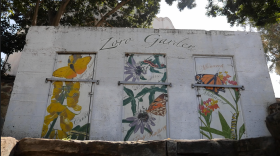STEVE INSKEEP, HOST:
The federal appeals court has ruled this week that a Trump administration program for some asylum-seekers can continue for now. This is the program that turns away some asylum-seekers from the United States and tells them to wait in Mexico until their cases are heard. Judges still have to rule on the broader legal issues in this case. And as the court case goes forward, some immigrant advocates say this policy is not offering real protections for migrants, even though it is known as the Migrant Protection Protocols. Monica Ortiz Uribe reports from El Paso.
MONICA ORTIZ URIBE, BYLINE: The Department of Homeland Security bills the Migrant Protection Protocols or MPP as a way to clamp down on foreigners trying to game the U.S. immigration system. It comes at a time when a crush of Central American families has overwhelmed officials at the southern border. Here's acting DHS Secretary Kevin McAleenan defending the program before Congress last month.
(SOUNDBITE OF ARCHIVED RECORDING)
KEVIN MCALEENAN: It allows us to take more people in at ports of entry who are presenting asylum claims because we can process them without the limitations in our capacity.
ORTIZ URIBE: On paper, DHS says, quote, "vulnerable populations may be excluded from MPP on a case-by-case basis" and that Mexico will provide appropriate humanitarian care for those who get sent back. It also assures migrants that they'll have access to legal help while in Mexico. But in reality, these claims don't play out so neatly.
(SOUNDBITE OF CAR HORN BEEPING)
IVONNE RUIZ: So we are crossing the border. We are leaving El Paso crossing now into Ciudad Juarez.
ORTIZ URIBE: Ivonne Ruiz strides up the international bridge toward Mexico, an unusual workday commute. Ruiz works for Las Americas in El Paso - one of six nonprofit legal offices listed on a handout migrants receive in immigration court. MPP began in California in January and expanded here a month ago.
RUIZ: We're literally having to go across the border to be able to provide intakes, consultations with people and see what we can do, which is something completely different, completely new. We never had to experience that before.
ORTIZ URIBE: It's a cumbersome trip. Wait times back into the U.S. can stretch up to four hours.
Imelda Maynard is an attorney with Catholic Charities.
IMELDA MAYNARD: A lot of private practice attorneys aren't touching these cases because, quite honestly, they would have to charge a fee that's just not able to be able to justify their time out of office.
UNIDENTIFIED PERSON #1: (Speaking Spanish).
ORTIZ URIBE: In a borrowed office space in Juarez, a Honduran woman shares her story with an American lawyer. Tears slide down her cheeks as she pulls copies of police reports and news articles from a plastic grocery bag. She says she was targeted by gangs for testifying in court as a witness to her mother's murder.
UNIDENTIFIED PERSON #1: (Speaking Spanish).
ORTIZ URIBE: "They killed my mom. They killed my dad, and they killed my sister-in-law," she says. The woman fled with her three young kids in early April. They turned themselves in to U.S. authorities and were sent back to Mexico. Attorney Linda Rivas with Las Americas has agreed to find representation for their case.
LINDA RIVAS: This is absolutely a good, viable claim. We would need several hours of legal work to ensure success in this case.
ORTIZ URIBE: In Juarez, migrants must compete for space at 12 shelters, all of which are at capacity. Aide workers report women and children sleeping on the streets, and violence is a major concern. Last Friday, a local newspaper reported three people carrying Honduran IDs were murdered. Rivas has represented two migrant fathers who testified in court about being kidnapped and robbed in Juarez.
RIVAS: There is no special funding for us to continue to do this work. As we continue to hear, the numbers keep growing. We don't know how long we'll be able to do this.
ORTIZ URIBE: According to figures provided by the Mexican government, close to 5,000 migrants have been sent back to that country since the MPP program began.
For NPR News, I'm Monica Ortiz Uribe in El Paso. Transcript provided by NPR, Copyright NPR.
NPR transcripts are created on a rush deadline by an NPR contractor. This text may not be in its final form and may be updated or revised in the future. Accuracy and availability may vary. The authoritative record of NPR’s programming is the audio record.







